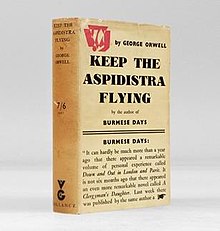Keep the Aspidistra Flying

First edition
|
|
| Author | George Orwell |
|---|---|
| Country | United Kingdom |
| Language | English |
| Publisher | Victor Gollancz Ltd |
|
Publication date
|
20 April 1936 |
| Media type | Print (hardback) |
| Pages | 318 (hardback) 248 (paperback) |
| OCLC | 1199526 |
| 823/.912 21 | |
| LC Class | PR6029.R8 K44 1999 |
Keep the Aspidistra Flying, first published in 1936, is a socially critical novel by George Orwell. It is set in 1930s London. The main theme is Gordon Comstock's romantic ambition to defy worship of the money-god and status, and the dismal life that results.
Orwell wrote the book in 1934 and 1935 when he was living at various locations near Hampstead in London, and drew on his experiences in these and the preceding few years. At the beginning of 1928 he lived in lodgings in Portobello Road from where he started his tramping expeditions, sleeping rough and roaming in the poorer parts of London. At this time he wrote a fragment of a play in which the protagonist Stone needs money for his child's life-saving operation. Stone would prefer to prostitute his wife rather than prostitute his artistic integrity by writing advertising copy.
Orwell's early publications appeared in The Adelphi, a left-wing literary journal edited by Sir Richard Rees, a wealthy and idealistic baronet who made Orwell one of his protégés. The character of Ravelston the wealthy publisher in Keep the Aspidistra Flying has much in common with Rees. Ravelston is acutely self-conscious of his upper-class status and defensive about his unearned income. Comstock speculates that Ravelston receives nearly two thousand pounds a year after tax—a very comfortable sum in those days—and Rees, in a volume of autobiography published in 1963 wrote: "... I have never had the spending of much less than £1,000 a year of unearned income, and sometimes considerably more ... Before the war, this was wealth, especially for an unmarried man. Many of my socialist and intellectual friends were paupers compared to me..." In quoting this, Orwell's biographer Michael Shelden commented "One of these 'paupers'—at least in 1935—was Orwell, who was lucky if he made £200 that year ... He appreciated Rees's editorial support at the Adelphi and sincerely enjoyed having him as a friend, but he could not have avoided feeling some degree of resentment toward a man who had no real job but who enjoyed an income four or five times greater than his."
In 1932 Orwell took a job as a teacher in a small school in West London. From there he would take journeys into the country at places like Burnham Beeches. There are allusions to Burnham Beeches and walks in the country in Orwell's correspondence at this time with Brenda Salkeld and Eleanor Jacques.
...
Wikipedia
